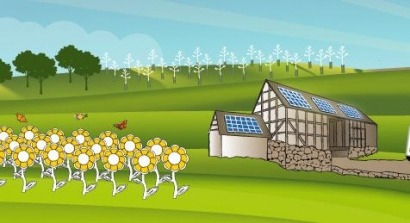
A recent survey conducted online and at Farming Futures events has found that 80% of farmers in the UK want to have solar photovoltaic arrays on their roofs within the next three years. Carried out by Forum for the Future's communications campaign, Farming Futures, and solar energy specialist, Solarcentury, the results from over 130 farmers across the country from September to November 2010 prove farmers' interest in generating clean electricity has soared following the launch of the solar feed-in tariff scheme in the UK.
According to the survey, 88.1% of farmers are currently considering renewables on their farm. The introduction of the FIT in April 2010 is deemed to be the main reason for their interest in installing renewables, with 83.2% of farmers considering renewables; as the financial incentive secures a return on investment for 25 years. Of those considering renewables, an overwhelming 93.3% are interested in solar photovoltaics, with wind energy as the second choice.
Ideal platforms for solar
"These findings certainly reflect what our members have been saying. Agricultural and horticultural buildings present ideal platforms for solar photovoltaics. It's hugely encouraging to see our farming industry become stronger through the generation of power, and helping this country reduce its reliance on fossil fuels," says Dr. Jonathan Scurlock, Chief Advisor, Renewable Energy and Climate Change, National Farmers' Union.
Recent publicity has centred on the popularity of ground-based arrays; however findings from the report indicate that just under 20% of farmers considering solar want it at this scale, the majority a looking at installing systems on large farm buildings. The findings indicate a move towards solar on farm roofs, similar to Glastonbury Festival's Michael Eavis who installed photovoltaics on his cow shed last year.
Stephen Frankel, from Wadebridge, is one of the many farmers starting to go solar. "We installed solar on our barn roof this year, and immediately starting saving on our bills and earning extra income thanks to the feed-in tariff,” he explains. “Traditionally, farming revenue is quite seasonal, but now we're making money by creating clean energy we have the peace of mind of another income, and we're doing our bit reducing our carbon footprint. I'd recommend any farmer to consider this - our land brings us so much value, so why not our roofs!"
Frankel views reflect a wider trend across Europe, where feed-in tariffs have been successful in encouraging farmers, amongst others, to diversify production with rooftop solar arrays for a number of years. However, the survey showed a relatively poor understanding of how the feed-in tariff worked and the incentives offered. Only 55.2% understood to what extent they could actually earn from the feed-in tariff; being paid for all electricity generated and consumed, as well as that exported. The remainder (25.4%) thought payment was only for generation, or export (19.4%).
"This survey shows that on-farm building solar PV is likely to become commonplace in the not-too-distant future. We have seen a real appetite for investing in solar this year, and it's great to see so many farmers recognising this opportunity to create an income and diversify - as well as contribute to developing a low carbon economy in the UK. Our recent events held to help farmers understand how to go solar have been hugely popular," says Madeleine Lewis from Farming Futures.
Integrated solar roofs
Back in April, an Oxfordshire farmer became the first in the UK to replace two of his barn roofs entirely with solar photovoltaics. John Woolcock from Chadlington has entirely reroofed two of his agricultural buildings with Solarcentury’s Energy Roof: an integrated solar technology which avoids the need to bolt on panels.
The roofs are 54.72 and 45.18 kWp in size, 555 Sharp panels covering a total of nearly 700m2 and expected to generate approximately £85,000 units of electricity for the farm. John is expected to see an annual income and savings of over £31,000 meaning the system will pay back its cost in under eight years. He will receive an annual index linked income of £26,663 from the generation ‘Feed-in tariff’, plus £2,012 from exporting electricity and annual savings of over £2,400 in electricity bills. The income is guaranteed for 25 years.
“Solar makes complete economic sense with its 8% return on investment, farmers know this now. But why would you want to bolt solar panels onto an old barn when you’re making such a financial commitment - you want something durable and good looking. We’re really pleased to have been able to update our buildings with roofs made entirely from solar, and of course to be the first to do it in this country,” says John Woolcock.
Energy Roofs can be seen on a number of French and Italian agricultural and industrial buildings, but these are the first in the UK to benefit from the feed-in tariff. Energy Roof has been tested to the same European standard as conventional roof coverings, prEN15601; with countries such as Italy incentivising such building integrated solar technology over standard bolt on systems.
The space needed for a medium-sized farm solar roof (60 kWp) is around 400-500 square metres. A typical 60kWp system produces 51,000 units of electricity a year which would meet most of the on-site power demands of an average farm. The capital cost of such a system is presently roughly £170,000 to 200,000. Farmers can earn in the region of £16,000 income a year, saving over £1,800 in electricity bills, with income and savings anticipated to be more than £465,000 over 25 years.
"Sustainable farming is at the core of a healthy future for the UK, and its great to see farmers recognising the opportunity they now have with solar. Solarcentury has helped hundreds of commercial organisations and farmers across Europe go solar and we welcome the opportunity to now help UK farmers get maximum return from their property. Solar power is a sophisticated active industrial building product designed to work with business," concludes Derry Newman, CEO, Solarcentury.
For additional information:

